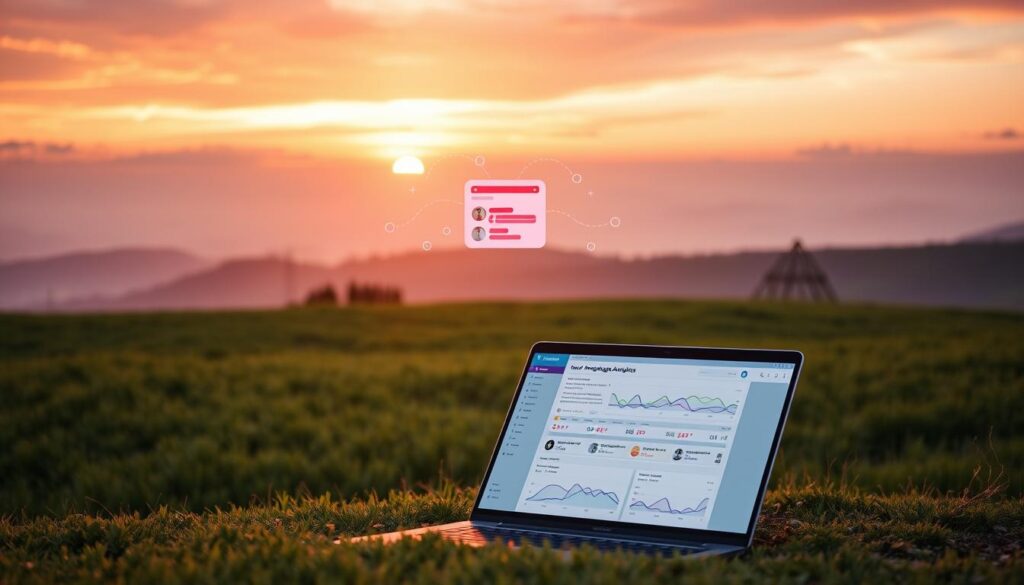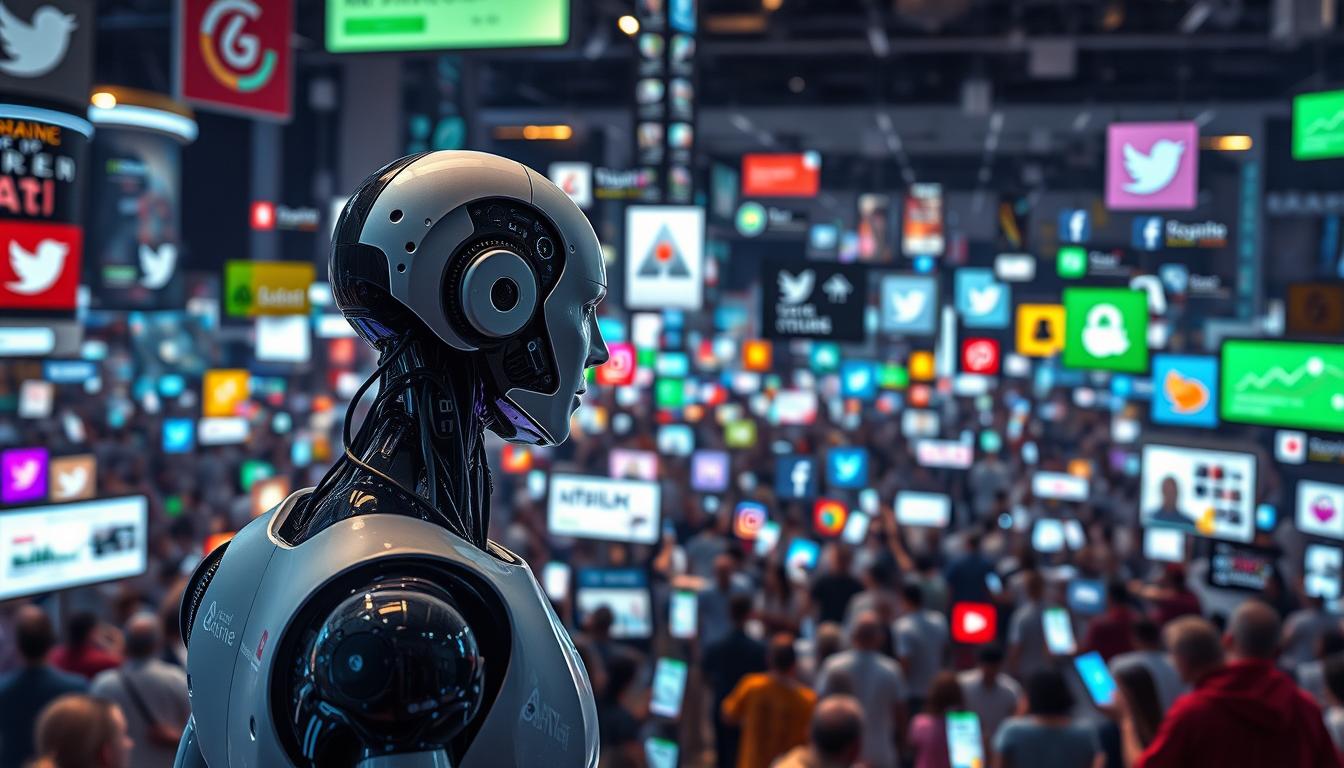Did you know that 80% of businesses already use AI for social media? This shows how big the change is towards using automation and artificial intelligence online.
AI is changing how companies handle their social media. It makes scheduling, analyzing, and talking to users much better. With AI tools, businesses can post content regularly, understand their audience better, and connect with followers in a more personal way.
Let’s dive into how AI is changing social media strategies. It’s bringing new benefits to both brands and users.
The Role of AI in Social Media Management
Artificial intelligence is key in social media management. It automates tasks and offers insights. Businesses use AI to manage content, analytics, and ads. This helps them create strategies that engage their audience and boost ROI.

AI makes sure content is relevant and timely. Tools like automated scheduling help plan posts ahead. This keeps the brand consistent and in line with trends.
AI also gives deep insights into user behavior. It helps marketers understand what their audience likes and how well campaigns are doing. By analyzing data, AI spots trends and helps make better marketing plans.
Another benefit is the precise targeting of ads. AI uses user data to find the best audience for ads. This means ads reach the right people at the right time.
| Function | AI Contribution | Benefit |
|---|---|---|
| Content Scheduling | Automates post planning and publishing | Ensures consistent brand presence |
| Analytics | Analyzes user behavior and campaign performance | Enhances understanding of audience preferences |
| Targeted Ads | Identifies appropriate target audience segments | Increases ROI through precise targeting |
In summary, AI is changing social media management. It automates tasks, offers detailed analytics, and targets ads precisely. AI makes social media marketing more effective and impactful for businesses.
Automating Content Scheduling with AI
In today’s fast-paced world of social media, using AI for scheduling is essential. AI tools make it easy to post content at the best times, keeping people interested.
Benefits of AI-Powered Scheduling Tools
AI scheduling tools are great because they use predictive analytics. This helps find the best times to post for more engagement. They also keep your social media consistent, which is important for algorithms.

Using these tools saves a lot of time. Social media managers can focus on making great content. AI can even change post times based on how well they do, to get better results.
Top AI Tools for Scheduling Social Media Posts
There are many AI tools for scheduling posts. For example, Buffer and Hootsuite let you plan posts for different social media sites. They also help improve your content with their suggestions.
- Buffer: It’s easy to use and gives detailed analytics to improve your social media plans.
- Hootsuite: It has lots of features, not just scheduling. It also tracks how well your posts do and suggests changes for better results.
- CoSchedule: This tool works with many social media sites and has a user-friendly interface. It also offers AI suggestions.
Adding these AI tools to your social media plan helps keep your posts consistent and effective. This boosts your engagement and saves time and effort.
AI in Social Media Content Creation
Artificial Intelligence has changed how we make social media content. It brings new ways to create engaging posts. With machine learning and generative AI, brands can now make content that speaks directly to their audience.
Generating Text, Images, and Videos
Tools like OpenAI’s DALL-E and Midjourney help businesses make great text, images, and videos easily. They use deep learning to create unique content. This makes making content faster and more creative.

Personalized Content and AI
Personalization algorithms are key in making social media content. They look at what users like and do to make content just for them. Hootsuite’s OwlyWriter uses this to make content that really speaks to people.
Machine learning also helps by finding patterns and predicting what users will like. This lets businesses stay ahead and give content that really matters to their audience.
Understanding User Engagement with AI Analytics
In today’s digital world, AI-powered analytics are changing how businesses see user engagement. They use natural language processing social media analytics and predictive analytics to understand what people like and do. This helps companies know their audience better.
Advanced Insights into Audience Behavior
AI tools give deep insights into how people interact with content. This knowledge helps businesses improve their strategies and make users happier. For example, natural language processing social media analytics can analyze user comments to see what people really think.

These tools also find out what topics are popular and what people talk about. This lets brands stay on top of trends and connect better with their audience. By knowing what users like, companies can make choices that really speak to their audience.
Real-Time Data and Predictive Analysis
Real-time data analytics help brands act fast when user engagement changes. Being quick is key in the fast world of social media. With predictive analytics, companies can guess what users will like next and plan their content ahead of time.
For example, predictive models can guess which posts will get the most likes based on past data. This not only makes users more engaged but also helps businesses get more value from their social media efforts.
| Feature | Benefit |
|---|---|
| Natural Language Processing Social Media Analytics | Uncover audience sentiment and trending topics. |
| Predictive Analytics | Forecast future user behavior and optimize content strategy. |
| Real-Time Data | Enable swift responses to changes in user engagement. |
Using these advanced AI methods in your social media plan can really improve how you understand user engagement. This leads to more meaningful and effective interactions with your audience.
AI in Social Media Customer Service
AI has changed how brands talk to their audience on social media. AI chatbots offer 24/7 support, quickly answering questions. This makes customers happier and more satisfied.
These chatbots can do many things, like answer common questions and process orders. They help users get help fast, without needing a human.
AI is great at collecting and using data. It learns from user interactions to improve future chats. This helps brands understand their customers better and serve them better.

AI systems also get better over time. They use machine learning to improve their answers. This makes them more accurate and helpful.
This is why AI is so valuable for businesses. It helps them stay ahead in the fast world of social media.
Here’s a table that shows what AI customer service can do:
| Feature | Description | Benefit |
|---|---|---|
| 24/7 Availability | AI-driven chatbots provide non-stop support, answering queries any time of day or night. | Improves customer satisfaction by offering immediate assistance. |
| Data Collection | Tracks and analyzes user interactions to gather valuable insights. | Helps personalize future interactions and refine service strategies. |
| Scalability | Handles multiple inquiries simultaneously with consistent accuracy. | Allows businesses to manage high volumes of customer interactions efficiently. |
| Cost Efficiency | Reduces the need for large customer service teams by automating responses. | Significantly lowers operational costs for businesses. |
| Continuous Improvement | Utilizes machine learning to enhance response accuracy over time. | Keeps the service updated and continuously improving with minimal intervention. |
Enhancing Social Listening with AI
AI is changing how businesses listen to social media. It uses deep learning to understand data from many platforms. This gives brands deep insights.
Sentiment Analysis and Brand Monitoring
AI is great at analyzing feelings in social media posts. It checks comments, reviews, and posts to see if they’re good, bad, or neutral. Deep learning algorithms quickly sort through lots of data. This keeps companies up-to-date on how people see their brand.
AI also watches for brand mentions everywhere. This saves time and gives useful tips for content and engagement. It helps brands know what to post and when.
Identifying Trending Topics
AI is also good at finding what’s popular. It looks at current events and social media to spot trends. This lets brands keep their content fresh and relevant.
By using AI, brands can make sure their messages match what people want. This makes them more relatable and engaging.
In short, AI tools like deep learning and sentiment analysis are key for social media management. They help brands stay on top of the digital world with ease and precision.
Using AI for Social Media Marketing Strategies
Artificial Intelligence is changing social media marketing. It uses powerful tools to make campaigns better. AI helps businesses reach the right people, saving money and boosting profits.
Precision Targeting of Advertisements
AI makes ads hit the mark with amazing accuracy. It uses smart algorithms to understand what people like. This way, ads speak directly to the audience, leading to better results.
AI keeps learning, so ads stay fresh and relevant. This means ads are not just targeted but also timely and fitting, making them more effective.
Dynamic Creative Optimization
Dynamic creative optimization (DCO) is a game-changer in social media marketing. It lets ads change in real-time based on what people like. AI tweaks images, text, and calls-to-action to grab attention.
This approach makes ads more engaging and relevant. It helps businesses stay ahead in the fast-paced world of social media marketing.
AI-Powered Influencer Marketing
Brands can boost their influencer marketing with AI tools. AI looks at lots of data to find users who match the brand’s values. This makes sure marketing is real and effective.
AI makes finding and working with influencers easier. It checks social media, how people engage, and who they are to find the best fit. This helps marketers create campaigns that really speak to their audience.
| Factors | Traditional Influencer Marketing | AI-Powered Influencer Marketing |
|---|---|---|
| Selection Process | Manual, often based on follower count | Automated, based on data analysis |
| Audience Analysis | Limited to basic metrics | In-depth demographics and behavior study |
| Customization | Generic, less targeted | Highly personalized and targeted |
| Efficiency | Time-consuming and labor-intensive | Fast and efficient |
| Outcome | Variable, often unpredictable | Measurable and optimized results |
Also, AI helps watch how campaigns do in real-time. This lets brands make changes fast to get better results. It helps them get the most out of their marketing efforts.
Ethical Considerations of AI in Social Media
AI is becoming a big part of social media. It’s important to think about ethics. We need to balance tech progress with moral values for growth and trust.
Data Privacy and Security
Keeping user data privacy safe is key. Companies must protect personal info from hackers and misuse. They should tell users how their data is used and kept safe.
Mitigating Algorithmic Bias
AI biases can harm fairness and trust. By focusing on AI ethics, we can fix these issues. Regular checks and updates help keep things fair and open.
AI in Social Media for Small and Medium-Sized Enterprises (SMEs)
Small and medium-sized enterprises (SMEs) are quickly using AI to improve their social media plans. They use AI tools to compete better with big companies. This gives them a big advantage.
Cost-Effective Solutions
AI tools help SMEs save money on social media tasks. They automate scheduling, analyze feelings, and give real-time info on who’s listening. This cuts down on the need for lots of people, making things more efficient and cheaper.
Competitive Advantages
AI helps SMEs in many ways, like better targeting and more engagement with customers. AI gives deep insights into what people like, so businesses can make content that really speaks to them. This makes their social media efforts much more effective.
Here’s a comparison of traditional versus AI-driven social media strategies:
| Features | Traditional | AI-Driven |
|---|---|---|
| Content Scheduling | Manual | Automated |
| Audience Insights | Basic Analytics | Advanced Predictive Analytics |
| Engagement | Limited | Enhanced Personalization |
| Cost | High | Cost-Effective |
For small and medium-sized enterprises, using AI in social media is key to staying ahead.
Conclusion
Businesses are now using AI in social media to succeed. AI helps with scheduling posts, creating content, and understanding customer data. It makes posting smooth and strategic, reaching the right people at the right time.
AI also changes how we analyze user engagement and create personalized content. It gives companies deep insights into what their audience likes. This helps in making marketing more effective and engaging.
For small and medium-sized businesses, AI in social media is a game-changer. It offers affordable ways to compete with bigger companies. As AI gets better, using it in social media will keep being key for better customer service and business growth.
